Richard Goldstone Presents U.N. Report
Judge Richard Goldstone, a South African Jew who had previously served as the chief UN prosecutor in both Yugoslavia and Rwanda, presents his UN-sponsored Report, “Fact Finding Mission on the Gaza Conflict.”

Judge Richard Goldstone, a South African Jew who had previously served as the chief UN prosecutor in both Yugoslavia and Rwanda, presents his UN-sponsored Report, “Fact Finding Mission on the Gaza Conflict.”
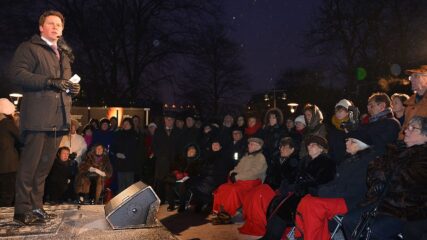
January 27, 2006 The first U.N.-recognized International Holocaust Remembrance Day is held on the 61st anniversary of the liberation of Auschwitz. The goal of the commemoration is to educate the nations of the world and…
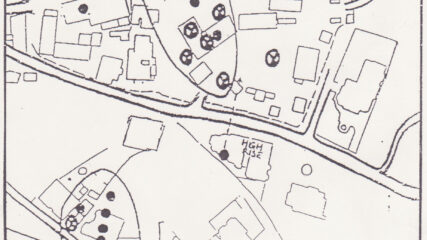
April 18, 1996 Israeli artillery fire strikes a U.N. compound where at least 800 Lebanese civilians are sheltering in the village of Qana in southern Lebanon. At least 13 shells hit the compound, killing 106…
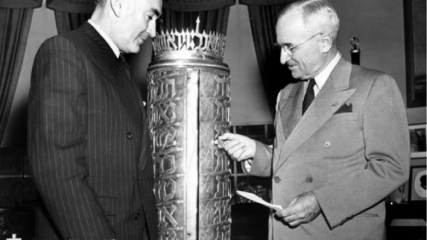
After a distinguished career in the service of Zionism and Israel, Eliahu Eilat passes away in Jerusalem at the age of 86.
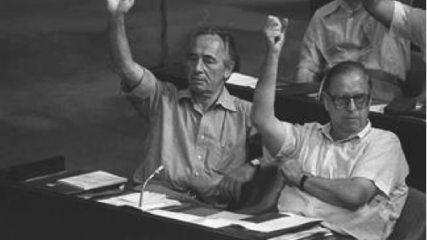
In 1950, the Knesset passes a law that states, “Whereas with establishment of the state of Israel, Jerusalem once more becomes the capital.” In 1980, the Knesset elevates the law to a Basic Law, giving the political status of Jerusalem increased legislative weight.
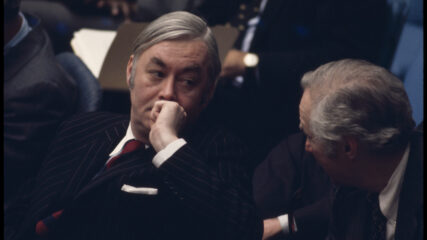
The United Nations passes UN Resolution 3379, which defines Zionism as a form of racism and racial discrimination. It passes with a vote of 72 in favor, 35 against, and 32 abstentions.
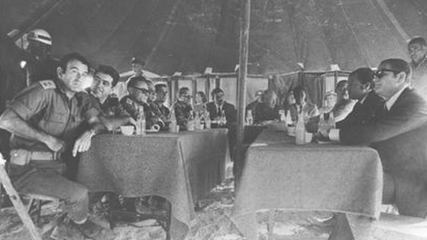
At the end of the October 1973 War, after several miscommunications, the first Egyptian-Israeli Military Talks between Generals commenced. These talks take place at 1am in Israeli-controlled territory, 101 kilometers from Cairo.
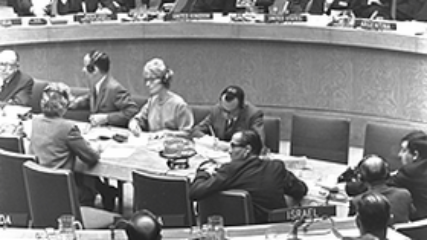
In the wake of the June 1967 Six Day War, the United Nations Security Council adopts Resolution 242, a document which has served as a framework for all major Arab/Israel negotiations since.

June 6, 1967 After leaving Jerusalem at the start of the Six-Day War the previous day, Israeli Foreign Minister Abba Eban speaks to the U.N. Security Council to explain the pre-emptive Israel Defense Forces attacks…
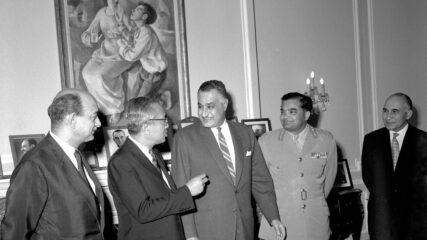
May 16, 1967 Egyptian President Gamal Abdel Nasser requests that the United Nations withdraw its peacekeeping troops from the Sinai, clearing an obstacle to war between Israel and its Arab neighbors. The Six-Day War begins…
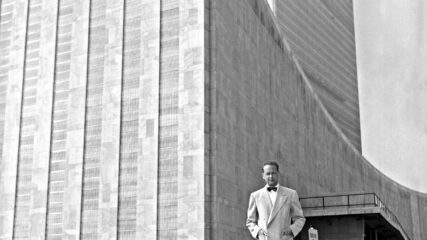
April 8, 1960 U.N. Secretary-General Dag Hammarskjold for the first time publicly criticizes Egypt’s confiscation of Israeli cargo on ships going through the Suez Canal. The Egyptian closure of the Straits of Tiran and the…

May 26, 1958 Four Israeli police officers and the chairman of the United Nations’ Israel-Jordan Mixed Armistice Commission are fatally shot by Jordanian fire in the demilitarized zone on Mount Scopus in Jerusalem. Both Israel…
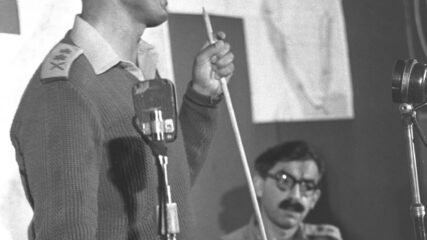
The Knesset debates Prime Minister David Ben-Gurion’s announcement that Israeli troops would withdraw from Sinai following the 1956 Suez War.

Two Israeli paratrooper platoons made up of approximately fifty IDF soldiers storm an Egyptian army camp in Gaza. The raid is a reprisal for continued fedayeen (Palestinian militants) attacks against Israeli civilians.

December 5, 1949 Prime Minister David Ben-Gurion declares in a Knesset speech that “Jewish Jerusalem is an organic, inseparable part of the state of Israel” and that Israel rejects any attempt by the United Nations…
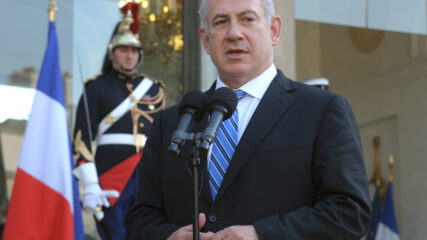
Benjamin Netanyahu, the ninth and current Prime Minister of Israel, is born in Tel Aviv. Although he spends a good portion of his childhood in Philadelphia, Netanyahu returns to Israel in 1967 to fulfill his service in the IDF.
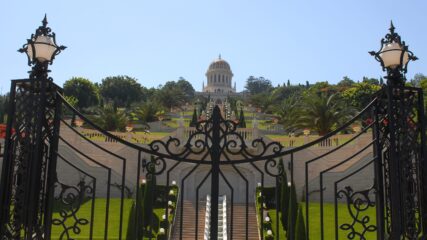
September 16, 1949 Israel becomes a member of UNESCO, the U.N. Educational, Scientific and Cultural Organization. Based in Paris, UNESCO has the purpose of creating peace and security by encouraging international collaboration in education, natural…
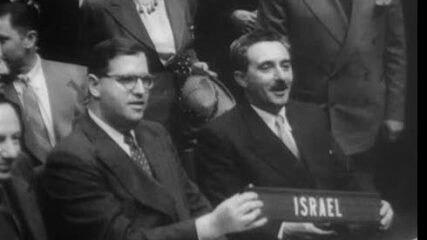
The UN General Assembly votes 37 to 12, with 9 abstentions, to admit Israel as its 59th member.
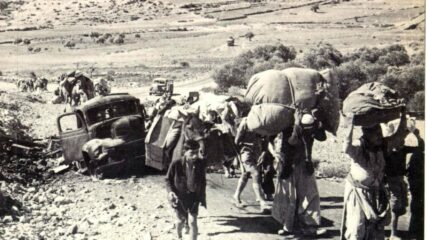
December 11, 1948 The United Nations General Assembly passes Resolution 194, addressing “the situation in Palestine” amid the ongoing Israeli War of Independence, on a vote of 35-15 with eight abstentions. The resolution never references…
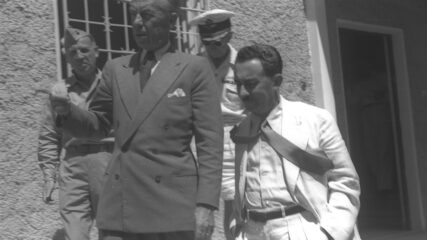
September 17, 1948 Count Folke Bernadotte, a diplomat sent by the United Nations to mediate between Israel and the Arabs during the War of Independence, is assassinated in Jerusalem by members of Lehi (the Stern…
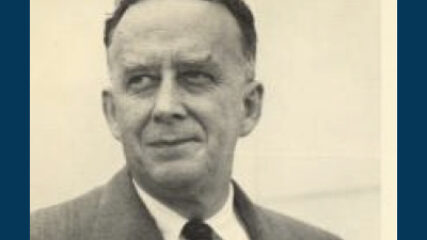
The US rejects a UN request that US Marines be temporarily stationed in Jerusalem to support an Israeli-Arab military truce agreement. The US continues its policy of supporting diplomacy in the region, while maintaining politically-strategic, military distance.
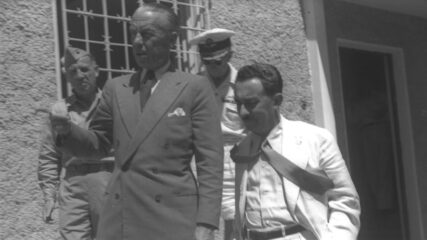
May 20, 1948 Count Folke Bernadotte is appointed by the U.N. Security Council as the mediator for Middle East peace efforts five days into the Israeli War of Independence. Bernadotte was born in Sweden in…
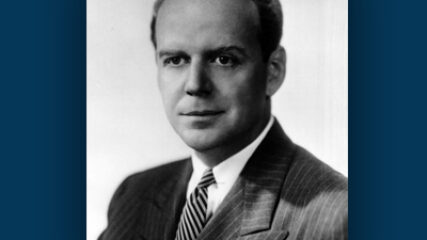
Clark Clifford did not want the US to waiver from the partition resolution passed at the UN in November 1947, which called for the division of Palestine into Arab and Jewish states.
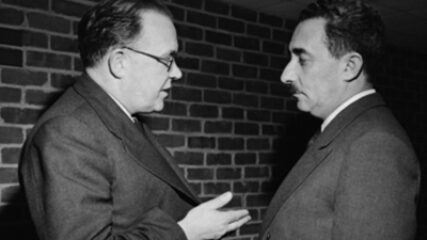
A two-day debate on the future of Britain’s presence in Palestine begins in the British House of Commons. Eventually it is decided to terminate the 1922 League of Nations Mandate for Palestine.